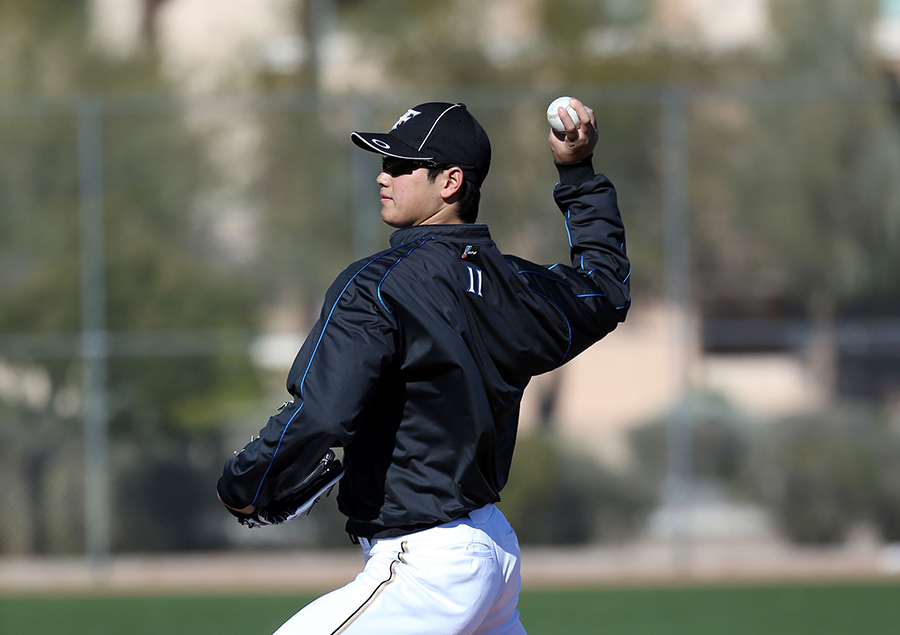Pool Rules Will Keep Shohei Otani From Coming To America


It’s understandable that Japanese righthander/slugger Shohei Otani is the talk of baseball this offseason.
He’s Babe Ruth brought to the 21st century. He can throw 100 mph or harder. He’s also one of the best sluggers in Japan. And he’s younger than Corey Seager.
Otani is coming off of an amazing season that saw him go 10-4, 1.86 with 174 strikeouts and 45 walks in 140 innings. He also hit .332/.416/.588 with 22 home runs in 104 games as the team’s DH.
As a two-way player for Team Japan in recent international exhibitions, he’s hit tape-measure home runs.
And he’s losing balls into the Tokyo Dome roof.
But he’s not coming to the America this offseason, no matter how poor the starting pitching free agent market is.
Otani is 22 years old. He’s only played in Japan for four seasons. Under current Collective Bargaining Agreement rules, that combination is enough to ensure Otani will keep hitting and pitching in Japan.
Because Otani is only 22, the team signing him would be subject to international bonus pool restrictions. And there’s zero reason that Otani would subject himself to those rules when he would be free and clear of them next offseason.
The only exceptions to the international signing rules are for players who are 23 or older and have played five or more seasons in a recognized professional league. Otani will have met both requirements after the 2017 season. Right now, he’s met neither.
The current CBA could be replaced by one as soon as Dec. 1, so it is possible that none of these current rules will apply. But if MLB continues to use current rules for international signees this offseason as expected, Otani would be treated the same way as a 22-year-old Cuban looking to sign.
That means that he is only eligible to sign a minor league deal with a signing bonus—no major league deals allowed. That in itself largely eliminates the chances of Otani being posted this offseason. While pretty much every major league team would have interest in bidding the $20 million maximum posting fee for the chance to negotiate a major league deal with Otani, the inability to sign him to a major league deal hurts the negotiation for both major league teams and for Otani.
For major league teams, it’s much easier to sign a top Japanese pitcher to a six-year, $60 million deal (like the one Yu Darvish received) where the paychecks are spread over many years, than it is to cut a one-time check of $50 million or $60 million to a player. From a cash-flow perspective, there are fewer teams that can get their ownership to spend such a large lump sum at one time.
And since Otani is subject to bonus pools, it wouldn’t just be a check to Otani. To sign Otani, a team would first have to pay Hokkaido the posting fee (up to $20 million), then pay Otani a sizeable signing bonus and then pay a 100 percent tax on that signing bonus to MLB. So if a team offered a hypothetical $50 million signing bonus for Otani, it would actually cost the team $120 million ($20 million posting fee + $50 million bonus + $50 million penalty tax).
And there are many reasons Otani would not want to be posted as well. Being posted this year would eliminate many of the teams Otani and his representatives would want to include in a bidding war. The Dodgers, Yankees, Red Sox and Angels would be eliminated from consideration.
Because they have exceeded their international bonus pools in the past two years, a full third of the league wouldn’t even be eligible to sign Otani. Ten teams are limited to spending no more than $300,000 on any signee this year: the Yankees, Red Sox, Rays, Diamondbacks, Angels, Dodgers, Cubs, Giants, Royals and Blue Jays. They would be ineligible to sign Otani this offseason unless they can get him to agree to less money than he will make in Japan.
And that doesn’t even get into the many reasons why Hokkaido would not want to post Otani. He won’t hit free agency for another five seasons. The maximum posting fee a Japanese team can receive under the current rules is $20 million. Unless Otani is hurt, Hokkaido knows it can likely receive that maximum fee next year, the year after or the year after that. The Japanese team gets no significant financial advantage by posting him early.
But from a team standpoint, Hokkaiso would be gutting its team by posting Otani. He is almost impossible to replace. He was arguably the Fighters’ best hitter. He was undoubtedly the team’s best pitcher. He’s one of the biggest stars in Japan and is a box office draw. And Hokkaido was the best team in the Pacific League.
Otani probably will be coming to the States next spring, but it will be with Japan when he plays in the World Baseball Classic (as long as Japan isn’t an early upset victim). Major League Baseball and fans will have to wait longer to see him in a major league uniform.

Comments are closed.